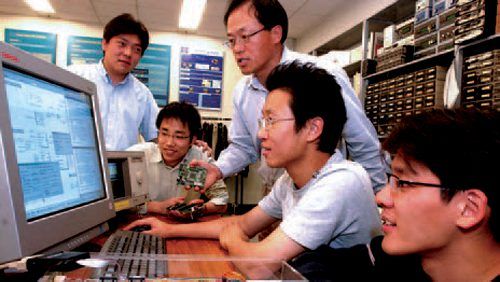ACE Lab Saves ECU Development Time and Prepares Engineering Students for Industry with Model-Based Design
"Hanyang University and ACE Lab recognize the importance of delivering a practical set of skills to Korea’s future engineers. Incorporating MathWorks tools into class assignments and exercises at our graduate and undergraduate levels has helped us to prepare students for professions in the automotive industry."
Challenge
Solution
Results
- 60% reduction in development time
- Extensible development platform
- Increased volume of trained engineers

The automotive industry is vital to Korea's economy, but development costs are increasing as automobiles become more technologically complex, fuel economy and security regulations tighten, and customer needs become more diverse.
The Automotive Control and Electronics Laboratory (ACE Lab), a research institute affiliated with Hanyang University in Korea, confronted this challenge by replacing their traditional control development process and software with MathWorks tools for Model-Based Design.
"The role of software tools is gaining importance as automotive technology becomes more complicated, developed, and diverse," says Professor Myoungho Sunwoo of the Automotive Engineering department of Hanyang University and manager of ACE Lab. "MathWorks tools for Model-Based Design enable us to unify our development process. Now, time delays and manual coding errors are minimized."
Challenge
ACE Lab’s traditional development process required system analysts to deliver requirements in textual formats, system designers to interpret and use these requirements to design control unit systems, software developers to manually create code, and testers to evaluate design viability.
This fragmented process made it difficult for development teams to collaborate and share information. Furthermore, errors could be detected only in the final stage of the development process, so work was often repeated, wasting time and money.
ACE Lab needed a common development platform and a design methodology based on a proven set of software tools that would enable them to integrate their previous development processes and provide students at Hanyang University with the engineering skills needed to succeed in industry.
Solution
ACE Lab replaced their traditional development processes and software with MathWorks tools for Model-Based Design. They are using the tools to design and develop powertrain, chassis, and frame-related electronic control units (ECUs) for next-generation vehicles. Hanyang University also uses the tools as part of their engineering curriculum to prepare undergraduate and graduate students for professions in the automotive industry.
"We selected MathWorks tools to teach our students as well as Korea’s automotive engineers through ACE Lab’s training programs," says Professor Sunwoo. "MathWorks tools will continue to play a critical role in providing engineers with the skills to meet the Korean automotive industry’s implementation of new technology."
Engineers model and simulate the main components of the engine and transmission with Simulink® and Simscape Driveline™. They use Control System Toolbox™ to design their ECUs and Signal Processing Toolbox™ to process the measured sensor signals.
They use Simulink Coder™ and Embedded Coder® to automatically generate code from their Simulink models. With Simulink Real-Time™, they evaluate the operation of the engine and sensor/actuator signals by running hardware-in-the-loop simulations of the system before validating the control code.
Engineers deploy the validated code to target processors, such as Motorola® MPC555 and HC2/2.
ACE Lab has formed a research consortium with Hyundai/Kia Motors, Hyundai MOBIS, KEFICO, and NGV to perform a ten-year study of network-based electronic control systems. The consortium will use MathWorks tools to design next-generation control systems.
Results
60% reduction in development time. "By applying Model-Based Design with MathWorks products, ACE Lab has reduced research and development time by 60% by unifying design, code creation, materialization, and test evaluation," says Professor Sunwoo.
Extensible development platform. Because MathWorks tools work with various target systems, ACE Lab can expand their development process by connecting to test equipment and analyzing system requirements with Telelogic® DOORS®.
Increased volume of trained engineers. With an established development platform based on MathWorks tools, ACE Lab increased the number of engineers trained from 200 to 450 in two years.